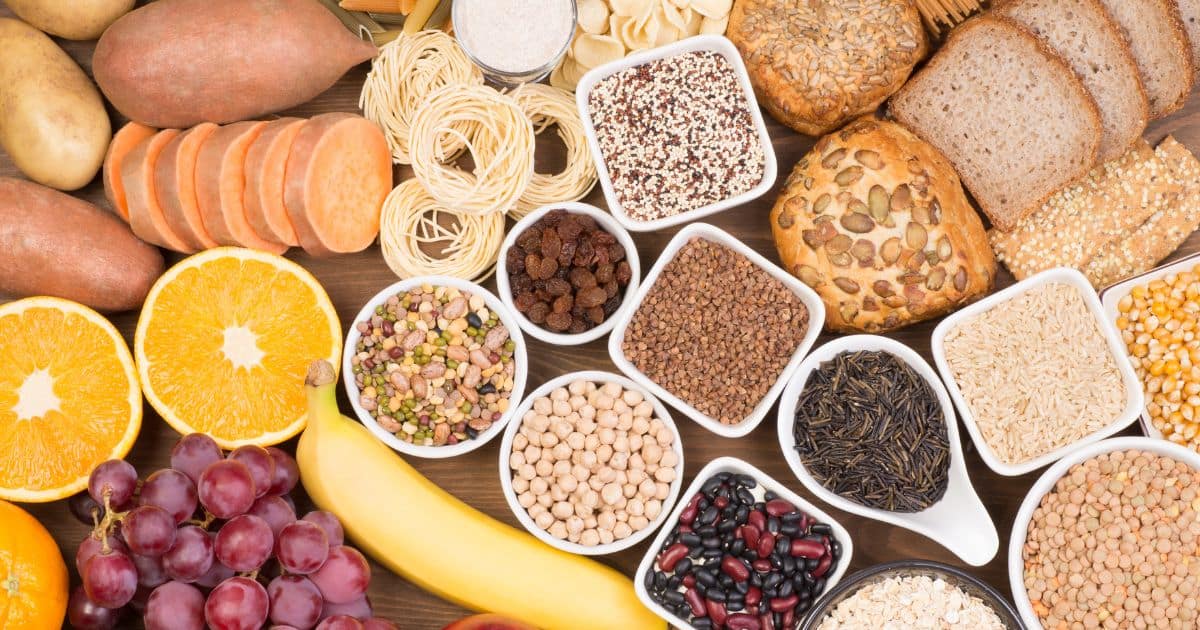Counting carbohydrates (“carbs”) is an important aspect of living well with diabetes.
After all, carbohydrates digest into glucose in the body, and glucose is what raises blood sugar levels.
But there are different types of carbohydrates: simple and complex.
This article will investigate the differences and similarities between simple and complex carbohydrates, as well as what you need to know when incorporating them into your diet.

Table of Contents
- What are carbohydrates?
- What foods contain carbohydrates?
- Why is tracking carbohydrates important for people with diabetes?
- What is the difference between simple and complex carbohydrates?
- Is one type of carbohydrate healthier than the other?
- What to keep in mind when eating carbohydrates
- Final thoughts
What are carbohydrates?
Carbohydrates are sugar biomolecules made up of carbon, oxygen, and hydrogen.
Along with protein and fat, carbohydrates are one of the three macronutrients in the human diet.
They are essential for many biological processes in the body, including:
- Providing energy for muscles
- Fueling the brain
- Enabling fat metabolism
- Preventing protein from being used as energy (allowing it to be used for tissue repair and maintenance)
Fiber, starch, and sugar are all carbohydrates.
Everyone needs carbohydrates to live, and they are the body’s preferred fuel for energy.
What foods contain carbohydrates?
Many foods contain some amount of carbohydrates, but carbohydrates are primarily found in the following foods:
- Fruits
- Vegetables
- Grains/starches
- Legumes
- Dairy and milk products
- Processed foods
Additionally, any packaged food that has added sugar also contains carbohydrates.
Even most “sugar-free” snacks and candy contain some amount of carbohydrates.
Be mindful of sugar and overall carbohydrate content when choosing snacks, and make it a habit to review the nutrition labels of packaged foods before consuming them.
Why is tracking carbohydrates important for people with diabetes?
In diabetes, the body has difficulty effectively managing glucose levels in the blood, often due to insufficient production or action of insulin — the hormone essential for transporting glucose into cells for energy use.
Since all consumed carbohydrates convert to glucose during digestion, accurately tracking them and adjusting insulin or other diabetes medications accordingly is crucial for maintaining blood sugar levels within a target range.
Therefore, when planning meals, it’s important for people with diabetes to account for the total carbohydrate content and adjust their medication doses as necessary.
In people with diabetes, fats and proteins can also affect blood sugar. However, their impact is generally less immediate compared to carbohydrates. Further research is needed to determine safe and effective adjustments to medication that consider these macronutrients.
It’s important to note that insulin is necessary for survival, even on days when no carbohydrates are consumed, making regular insulin administration a key component of many diabetes management plans.
What is the difference between simple and complex carbohydrates?
There are two main types of carbohydrates: simple and complex.
Fiber and starch fall under the category of complex carbohydrates, while sugar is classified as a simple carbohydrate. The nutritional value of a food item is influenced by its proportions of these components.
Simple carbohydrates
Simple carbs, found in foods like table sugar, candy, syrups, and fruit, consist of short chains of sugar molecules, providing rapid energy release and causing quick increases in blood sugar levels.
This is why simple carbohydrates, such as candy and juice, are often used to treat hypoglycemia (low blood sugar).
Complex carbohydrates
On the other hand, complex carbs, found in foods like whole grains and whole grain products, legumes, fruits, and vegetables, are made of longer chains of sugar molecules, requiring the body more time to break down.
As a result, they provide a more gradual release of energy and lead to a slower, steadier rise in blood sugar levels over time.
Is one type of carbohydrate healthier than the other?
Not necessarily — it all depends on the body’s needs at any given moment.
For instance, “carbohydrate loading” with complex carbs, like whole-grain pasta, is often recommended the night before a marathon. The idea is that the body stores the extra glucose from these carbohydrates in the liver and muscles, then releases it as energy during the run when it’s most needed. In this context, complex carbohydrates are more advantageous than simple ones.
On the other hand, during an episode of low blood sugar, consuming simple carbs, such as a piece of candy, can quickly elevate glucose levels, which is more effective than consuming a complex carbohydrate like whole-grain pasta.
It’s important to recognize that nutritious foods can contain both types of carbohydrates: fruits and vegetables contain simple and complex carbohydrates, while foods like brown rice and whole-wheat products provide mainly complex carbs.
Some additional examples of foods containing simple and complex carbohydrates are listed below:
Foods high in simple carbohydrates:
- Fruit juice
- Candy
- Syrups
- Whole fruit (in the form of naturally-occurring sugar)
- Milk and other dairy products (naturally contain lactose, which is a simple sugar)
- Sugary drinks
- Baked goods and sweets with added sugars
- Some vegetables (in the form of naturally-occurring sugar)
- Most common hypoglycemia treatments, such as glucose tabs, gels, and cake icing
While whole fruits and some dairy products also contain simple sugars like fructose and lactose, they are paired with nutrients and fiber, offering more nutritional value.
It’s generally recommended to limit intake of simple carbohydrates that come from added sugars, such as sugar, brown sugar, corn syrup, or high-fructose corn syrup, or from heavily processed sources.
However, in situations like treating low blood sugar, consuming simple sugars becomes necessary for quick glucose replenishment.
Foods high in complex carbohydrates:
- Brown rice
- Whole-wheat pasta
- Barley
- Buckwheat
- Bulgar wheat
- Oats
- Wild rice
- Spelt
- Peas
- Beans
- Vegetables
While both whole and refined grains provide complex carbohydrates, whole grains such as brown rice, barley, and oats retain all parts of the grain — the bran, germ, and endosperm — offering a richer source of fiber, vitamins, and minerals.
In contrast, refined grain products like white flour, white bread, and white rice have been processed to remove the bran and germ, resulting in a product with lower nutritional value. Although they still contribute complex carbohydrates to the diet, they lack the full range of nutrients found in their whole-grain counterparts.
What to keep in mind when eating carbohydrates
When considering carbohydrate intake, it’s important to recognize the differences between simple and complex carbohydrates and their effects on blood sugar levels.
As previously discussed, simple carbohydrates can lead to quick spikes, whereas complex carbohydrates usually result in a slower, more controlled increase, potentially helping with better blood sugar management over time.
Paying attention to total carbohydrates on food labels is crucial for making informed dosing and dietary decisions. Additionally, monitoring added sugars — which are now listed separately on Nutrition Facts labels in the United States — can significantly improve the nutritional quality of your meals and make diabetes management easier.
Also, considering the fiber content in foods can be beneficial, since fiber can moderate blood sugar responses by slowing carbohydrate absorption and does not contribute to increases in blood sugar levels.
Subtracting the number of fiber grams from the total grams of carbohydrates will provide you with the amount of “net carbohydrates” that would affect your blood sugar level.
(“Net carbohydrates” is not a regulated term, nor is it officially recognized by the U.S. Food and Drug Administration [FDA] or the American Diabetes Association [ADA], but it is generally understood to mean the number of carbohydrates that will eventually impact blood sugar levels.)
Speak with your doctor or a registered dietitian (RD) if you have questions or concerns about incorporating complex versus simple carbohydrates into your diet.
Final thoughts
Both simple and complex carbohydrates play important roles in providing energy, but they differ in their digestion rates and effects on blood sugar levels.
Simple carbohydrates, quickly digested, are useful for immediate energy needs, such as treating low blood sugar in diabetes. Complex carbohydrates, with their longer sugar chains, offer sustained energy release, contributing to more stable blood sugar management.
It’s not about labeling one type of carbohydrate as healthier than the other. Rather, it’s about choosing the right type for your body’s current needs and considering the overall nutritional value of the foods you consume.
Whole fruitsand dairy products provide mostly simple sugars, while whole grains, legumes, and vegetables offer more complex carbohydrates. However, both contain vitamins, minerals, and other beneficial compounds
Conversely, refined sugars and grains, though sources of carbohydrates, lack the nutritional benefits of their whole counterparts.
In managing diabetes, it’s essential to look beyond the type of carbohydrate to the total carbohydrates, fiber content, and presence of added sugars in your food. Understanding your body’s needs and maintaining a balanced approach to carbohydrate intake can significantly improve the quality of your diet and your diabetes management.




